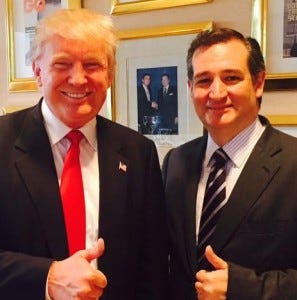The other day, I was talking to a friend of mine about the ongoing drama of the Republican primary. My friend is a right-leaning thinker, and isn't terribly engaged in national politics, but his assessment was similar to mine in that he believes things are looking awfully good right now for Hillary Clinton.
After we commiserated for a few minutes, he turned to me and asked, "So who would you rather lose with: Trump or Cruz?"
I laughed at the comment, but it did force me to ponder the hypothetical situation, as painful as it was to do so. The lost potential of this primary has long been a sore subject for me, to say the least.
One of the big frustrations I've had since last summer has been the reluctance of many of my fellow Republicans to factor general-election viability (aka electability) into their evaluations of the candidates.
This isn't merely some anecdotal conclusion I've reached, based on the popularity of certain candidates and state election results. The specific question of electability has been asked in a number of national polls and exit polls over the past several months, and it routinely ranks as one of the lowest considerations of Republican voters in their choice of a nominee. The state of where we're at in the primary simply reflects that.
There were once multiple Republican candidates who polled quite well with the general electorate, but that's no longer the case. Now, the only two candidates who have any real chance of picking up the nomination (Donald Trump and Ted Cruz) are both losing in national polls to Hillary Clinton. And she herself has very high negative ratings with voters.
This isn't a good situation for the GOP. Cruz is at least within striking distance in the polls. Trump (the GOP front-runner) isn't.
Now, there is a part of me that understands why so many Republicans haven't put a whole lot of stock in the electability factor. Many disagree with the premise.
In 2008, John McCain was deemed by most political observers to be the best general election candidate the GOP could have possibly put forth. He lost. The same was true of Mitt Romney in 2012.
There have been several arguments over why these men didn't pull off victories, but the consensus among the Republican base is that:
The candidates' messaging was wishy-washy, lacking strength and conviction. In other words, it was too moderate.
The candidates played too nicely with the other side (McCain refused to go after Obama's association with Reverend Jeremiah Wright, and Romney blew his opportunities to hit Obama hard on Benghazi).
Of course, there was also that matter of a severely damaged GOP brand, that came as the result of a deeply unpopular war in Iraq, and a financial crisis that occurred on a Republican president's watch.
Two big losses, the country's increasingly weak stature under Obama, and the perception of an ineffective Republican congress have called into question many conventional methodologies, as far as many voters are concerned. This includes people's traditional understanding of campaign electability.
Such skepticism, however, doesn't change the fact that national polling in presidential election years is typically pretty accurate. And right now, the polls show that the GOP is going to have a heck of a hard time winning in November — not just with the popular vote, but much more importantly with the electoral college.
Can the situation change between now and then? Anything's possible, and I do expect some of the polls to tighten, even if marginally.
Still, one can't ignore the reality of just how sharply the GOP has been divided. This primary has been a very ugly process, and the party will likely lose many of its base members once a nominee is decided (probably at the convention in Cleveland). Without solid support from the base, the situation for the nominee (regardless of who it ends up being) looks pretty hopeless.
This brings me back to the hypothetical question my friend asked me: If the Republican nominee were indeed to lose, would you rather it be Donald Trump or Ted Cruz?
As I've explained in previous columns, I won't be voting for Trump if he's the nominee. The man has done everything possible to keep me from supporting him. I believe he's just as dishonest and disinterested in this country's best interests as Hillary Clinton. And while his defeat might serve as just deserts to those who've shelved their ideals and senses of decency to prop him up as something he clearly isn't, I'd rather my party (and my principles) go down fighting.
I've never been much of a Cruz fan, but if he were to become the nominee, I would absolutely vote for him in the general election. I would hope for him to win the presidency and lead our country for the next four years. But if he lost, I'd at least find some comfort in knowing that Americans had the choice of a principled alternative — someone running on something other than personal ego and endless hyperbole.
Plus, with Cruz's name on the ballot, the GOP might not lose control of congress, which would be needed in a Clinton presidency.
Of course, none of this is up to me. It's up to the voters.



